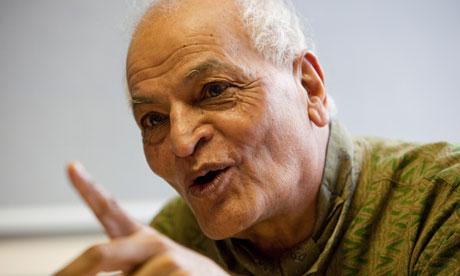
original image source The Guardian
SITTING in a crowded room with a figure like Satish Kumar is a strange feeling. Not only is he the Editor in Chief of the excellent Resurgence publication but he is also, as you would probably expect, an inspirational character. Put simply, every word he speaks seems profound and considered, there is no rush to talk or desire not to listen. The man stimulates every urge you have to be a better person, with the shortest of sentences.
This past week, we were given the opportunity to attend a workshop with Satish at the Eco Technology show in Brighton; the aim of the workshop was to discuss Green and Sustainable Technology, what technologies would better our planet and the fine line that can lead to technology challenging the grain of nature. It started with Satish going around the room asking everyone to introduce themselves; it didn't take long for it to become apparent that we were in good company with representatives of WWF and colleagues at The Ecologist all in attendance. Nonetheless nobody was under any illusion as to why we were all together: to listen to Satish and gain some insight. Moments after we began it was clear that we would not leave disappointed.
“When matters are urgent we need to be more patient”
Satish implored the room to consider that the most delicate and difficult situations are the exact situations that should be dealt with the most amount of care and the least amount of haste. The consideration here is to think about longevity, far too often is technology developed to replace a problem that has been created by another technology – and increasingly this technology is not as Satish labelled it “good technology” but “bad technology”.
“Bad technology” is not what we need, rather that we want - in order to fulfill greed or vanity. It is technology that takes away the natural and real feeling of pain that we feel as humans. Satish suggests that we should feel pain and we should feel suffering because we are human, and as humans we can learn to hone these emotions to be considered and humble. This is not to say that we should not use technology to help ease suffering, rather that we should look at the causes of the suffering, consider our own actions and consider what we can do as people first before we rush to use technology.
“We need to redesign our cities”
To Satish it is clear, our cities are not allowing us to function as humans. We have become far too set in a routine of work and virtual social interaction, and not nearly dedicated enough to real communities and personal growth. In order to change this, and to ensure that the developing world does not make the same mistakes that we have made, we will need to learn from our mistakes, be active and brave in the large steps, but also independent and responsible for small measures that every citizen can take. The encouragement of community projects was echoed throughout the room.
As the workshop came to an end Satish introduced a short film about Resurgence magazine – in it’s 40th year it continues to open doors and pose the challenging questions. Gathering my thoughts of the workshop, I considered what lessons I could learn from some of the inspirational people that I had shared the room with, what my underlining feeling was of the past two hours. I had felt inspired by some of the stories that had been told but concerned that Satish was in some respects preaching to the converted, could this be transferred to the wider world, how could we together make a cleaner footprint? Struggling to find the words Satish did what he had done so eloquently well for the past two hours, summarised my thoughts with one short moment;
“People are too clever, not enough wise”
The work that publications like Resurgence do should never be understated, it is publications like this and people like Satish that remind the world how we have forgotten and ignored our most human instincts and in some instances favoured answers of complexity over simplicity.
